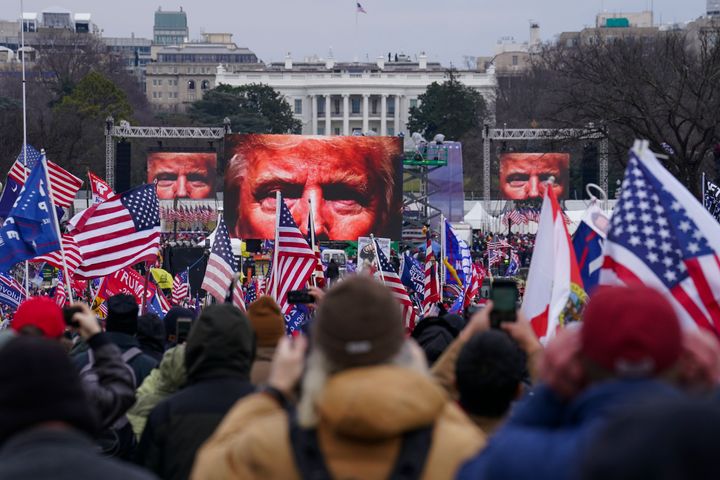WASHINGTON — An order from a president to the military to conduct a coup to remain in office “might well be an official act,” Donald Trump’s lawyer told the Supreme Court in oral arguments Thursday on the question of whether Trump’s attempted coup is immune from prosecution.
Trump’s claims that his actions leading up to the violent assault on the Capitol on Jan. 6, 2021, are immune from prosecution received skeptical questioning from nearly all of the nine justices, but none more on-point than Elena Kagan’s question about 40 minutes in.
“How about if the president orders the military to stage a coup?” Kagan asked.
“That might well be an official act,” Trump attorney John Sauer answered.
Trump was not at the Supreme Court during the oral arguments Thursday but rather was in a different courtroom, in lower Manhattan, in the early phase of an unrelated criminal trial.
He has made it clear, though, that he is keenly aware of the import of the high court’s coming decision. On Monday, he posted an all-capital-letters screed demanding that all actions taken by a sitting president be given “complete & total” immunity, even those that “cross the line.” He ended with: “God bless the Supreme Court.”
Thursday morning, just minutes before he was due in the New York City courtroom, he posted three more times about the immunity case: “WITHOUT PRESIDENTIAL IMMUNITY, IT WOULD BE IMPOSSIBLE FOR A PRESIDENT TO PROPERLY FUNCTION, PUTTING THE UNITED STATES OF AMERICA IN GREAT AND EVERLASTING DANGER!”
Trump has previously stated that he hoped the three justices he nominated ― Neil Gorsuch, Brett Kavanaugh and Amy Coney Barrett ― would be loyal to him and has subsequently complained that they and the others selected by Republican presidents have treated him unfairly in an attempt to appear nonpartisan.
Trump’s lawyers have tried the same immunity arguments twice, before U.S. District Judge Tanya Chutkan and a three-judge panel of the U.S. Court of Appeals for the District of Columbia Circuit. In both courts, the judges sided with prosecutors who argued that a former president should have no more immunity from prosecution than anyone else and that, specifically in this case, Trump’s actions to overturn an election were an attack on the foundations of the republic.
During the appeals court oral arguments, one of the judges asked Trump’s lawyer if under Trump’s immunity theory a president could order SEAL Team Six to murder a political opponent and then never face criminal charges. Trump’s lawyer eventually answered yes, that was a possibility.

With Trump running for his old job, the timing of the high court’s decision may be as important as its substance.
A relatively quick ruling simply affirming the appeals court decision that Trump’s action leading up to and on Jan. 6, 2021, are not immune from prosecution could allow Chutkan to begin a trial by late summer, which would likely produce a verdict by Election Day, on Nov. 5.
Though most legal experts doubt justices would decide that a president enjoys blanket immunity, some believe they could rule that a president does have immunity for official acts ― and then send the case back to Chutkan to hold a hearing to determine whether the charges against Trump involve official actions on behalf of the country or private ones for his own personal or political gain.
Such a hearing, while it would bring forth testimony from former Trump White House officials damaging to Trump, could mean that a trial may not conclude by Nov. 5, particularly if the Supreme Court does not issue a ruling until the close of its term at the end of June.
Trump faces four felony counts in the Jan. 6 indictment: conspiracy to defraud the United States, conspiracy to obstruct an official proceeding, obstructing an official proceeding and conspiracy to deprive millions of Americans of the right to have their votes counted. If convicted, he could face decades in prison.
Should Trump regain the presidency, however, he could order the Department of Justice to dismiss any unresolved federal charges against him ― both the Jan. 6 case as well as a South Florida federal prosecution based on his refusal to return secret documents he took to his Palm Beach country club upon leaving the White House.
Trump is facing a separate Jan. 6-related state-level prosecution in Georgia for trying to overturn his election loss there. A trial on those racketeering and conspiracy charges could take place later this year.
And in New York City, Trump is currently on trial on charges that he falsified business records to hide $130,000 in hush money payments to a porn star in the days before the 2016 election. Trump has said nothing he did in the scheme to bury her story was illegal.
Disclaimer: The copyright of this article belongs to the original author. Reposting this article is solely for the purpose of information dissemination and does not constitute any investment advice. If there is any infringement, please contact us immediately. We will make corrections or deletions as necessary. Thank you.
